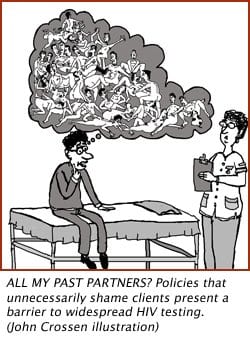In Ontario, you’re entitled to an HIV test that’s anonymous. But some clients of the Sexual Health Centre on Clarence St are discovering that their tests are less anonymous than they thought.
If you tell clinic staff that you may have been exposed to HIV, workers will likely ask you to recall every individual you engaged in sexual activity with since your exposure, including divulging their contact info.
If you go in for an STI test coupled with an HIV test, your anonymity is disregarded, as anonymous STI tests are not guaranteed in the Provincial Health Act.
And while the Provincial Health Act does include anonymous HIV tests, there is no set province-wide procedure for anonymous HIV testing and each centre has their own way of doing things.
“This is a really unfortunate experience for a lot of people,” says Adam Graham, Gay Men’s Prevention Coordinator at the AIDS Committee of Ottawa (ACO). “The expectation when you hear the words anonymous testing, what I think is and what a lot of other gay guys in the community think is that you go to a space and every procedure will be anonymous.”
“That’s what should be set up in the community but that’s not what’s happening at the current time.”
Orhan Hassan, manager of the Clarence St clinic, says that if you are asked to recall past partners, you will still remain anonymous as all information is held in confidence.
“We’re required by law to make an effort to notify other people that may have been exposed,” says Hassan. “But we would not reveal [your] identity to the individuals.
“Whatever happens, it remains confidential. If you came in for an STI test and would like to have an anonymous HIV test we would not compile all that information in one chart.”
Barry Deeprose, co-chair of the Gay Men’s Wellness Initiative, says that people thinking about being tested should know their options ahead of time.
“If you go in and say you want to get tested, then a whole bunch of questions follow. If you go in and say you want anonymous testing then that should be it,” says Deeprose.
“If you think you’ve been exposed, you shouldn’t have to reveal the names of past partners. That would connect your identity to the results. That’s not anonymous, that’s a contradiction, an oxymoron. We’re trying to tear down the barriers that come with getting tested.”
Deeprose recalls the 1980s, when people were forced to reveal their identity. As a result, many gay men simply didn’t get tested.
“Ottawa has a bad record with this; it seems to be the exception to the rule with public health.”
Graham recommends that if you want to get tested, go once for an HIV test and a second time for any non-HIV STI tests. This way you would be able to have your HIV test remain anonymous.
Graham also encourages clients to give a false name if you are coerced into revealing your identity during an HIV test.
Some clinics like Toronto’s Hassle Free Clinic ask only for your health card number in order to bill the province. Your identity is not kept on record and your results are linked to a serial number and kept completely separate from any STI test results.
All of these factors that come along with getting tested in Ottawa make the process of undergoing an HIV test less appealing, and Graham says they point to enormous problems with our current testing system.
“Those systemic problems need to be addressed with people who control our provincial health acts. I can’t comment on the staff. I know that there probably is some room to move with the staff at the Clarence St location. There obviously is a need for more training. If someone is going in for anonymous HIV testing and they’re not being asked if they want to have their test to be anonymous, then that is a systemic problem but also a problem with training.”


 Why you can trust Xtra
Why you can trust Xtra


